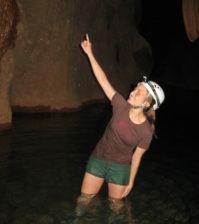Week 5: Work hard, be nice to everyone and have high standardsby Natalie Punt As our summer progresses, the amount of knowledge and skill I am developing increases. This is the first research project that originated from my original idea and holding the reins is thrilling and demanding. So far, I have learned three things from the creation and design process. These three things can be applied to all aspects of life and here is how I applied them to my summer research. 1) Work hard Hard work or working hard is ubiquitous in science. It is the common factor behind most experiments, publications and careers. I consider hard work a gradient, with many integrated levels. What one considers hard may be easy for another. Similarly, some are more capable of sustaining a high level of work and productivity. I am learning what my definition of hard work is and how to maintain a high level of work. I define hard work- as working with purpose towards a set, defined goal. This means modulating my output to match my goals. And working towards a goal requires having a goal that can be defined. Working hard in my project has required me to develop clear, achievable goals and progress with purpose towards my goals. One of my goals was to perform a cluster analysis to visualize the similarities of my protein population between the Naked Mole Rat, human, dog and mouse. four species. The proteins in this population are involved in cancer and differences in their amino acid sequence could contribute to differences in cancer types between species. To accomplish this goal I needed to learn how to perform statistical analysis including Pearson, correlation coefficient and Students t-test to verify that the amino acid sequence identities between protein populations could be compared to each other. Then find a computer program to perform the cluster analysis and visualize it. However, after performing the cluster analysis I learned that I had not set an appropriate threshold level and had several false positives. To eliminate the false positive I had to go re-evaluate what I consider an ortholog or protein shared between two species. 2) Be nice to everyone Universal law, right. Most people are amiable- that is until they’re stressed, having a bad day, feeling off or just don’t like another person. Then people can become downright unpleasant. I feel that being nice to others has profound effects that can start a chain reaction of smiles and ultimately make the world a better place, if not happier. And being happy when you’re stressed or having a bad day is priceless. My research required me to talk with senior faculty and present my work often. When meeting with them, I couldn’t pretend to be immune to stress or never have an off-day, because it wasn’t true. By admitting to them through authentic actions that this is who I am, they could better access my progress and capabilities. Similarly, support staff provided me with vital resources throughout my project. By being respectful, nice and authentic, we formed valuable relationships. 2) Set high standards and be relentless in achieving them. High quality science stands alone. Reading a great publication is exhilarating, inspiring and enlightening. This summer, we witnessed parallel sequencing of multiple breast cancer types, discovery of the Higgs boson, dissemination of the flu virus and how neutrophils brake to arrive at their immunological destination. Despite the disparity of the subject, each achieved and maintained a high standard to produce high quality science. In my project, I have a well-researched idea of what problems my research can address, the outcome of my results, how my figures should look and the flow of my presentation. These projected ideas do not make my research pre-set- these ideas establish a level of quality and workmanship I aim to achieve. My past projects, gave me the enjoyable sensation of developing projects to a high standard. This sense of achievement is my guide towards a high standard of quality. As my summer progresses, I have learned that in order to achieve the goals I have for my summer project- I need to have idealistic, high standards and work hard to achieve my standards. As my research is largely self-guided it can be stressful when encountering obstacles or challenges en route to my ideas. Yet I know these are my obstacles and challenges and how I handle the challenge is ultimately a reflection on myself. About the Blogger
0 Comments
Your comment will be posted after it is approved.
Leave a Reply. |
The Lab JournalWelcome to the summer internship series of 2012! Follow 9 Scientista bloggers through their summer internships to catch a glimpse of what it is like to be a scientista^TM. By Title- India Presents: A "New World Symphony"
- Through The Lens: The Intricacies Of Diabetes - Do Nanoparticles Glow? - Using Unusual Animals to Study Human Disease - Using the Hubble Telescope - You Think What You Eat - Experimenting With the Life of a Scientist(a) - 18.085: My Summer at MIT - Science Heals: A Summer of Global Health Research By BloggerRabeea Ahmed
Riana Balahadia Shaira Bhanji Nzuekoh Nchinda Amy Beth Prager Natalie Punt Juliet Snyder Pin-Wen Wang Stephanie Wang Archives |
The Scientista Foundation, Inc. All Rights Reserved © 2011-2021 | Based in NY | [email protected]
The Network for Pre-Professional Women in Science and Engineering
The Scientista Foundation is a registered 501(c)(3) -- Donate!
The Network for Pre-Professional Women in Science and Engineering
The Scientista Foundation is a registered 501(c)(3) -- Donate!


 RSS Feed
RSS Feed